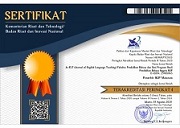THE USE OF SELF-REFLECTIVE STRATEGIES IN TEACHING READING FOR STUDENTS OF VOCATIONAL SENIOR HIGH SCHOOL AT SMKN 1 LAMONGAN
Abstract
This study aims to describe the use of self-reflective strategies in teaching reading at a vocational senior high school. Self-reflective strategies used in enhancing the students of vocational senior high school to reflect their comprehension on the given reading materials. This activity was considered effective in order to practice and drill the students’ critical thinking. The strategies should be implemented repeatedly to make the students more skillfully creating their comprehension on the given reading materials by integrating the keywords extracted from the given reading materials. This study was implemented in experimental design at two classes of Institutional Finance Accounting department (Akuntansi Keuangan Lembaga/AKL) class Xth. The experimental class was class Xth AKL1 that it consisted of 35 students. The control class was class Xth AKL2 consisted of 34 students. Class Xth AKL1 was chosen as the experimental class based on the class’ mean of the pretest that it was 2 points lower than class Xth AKL2. The () of the pretest score from class Xth AKL1 was 76. The of the post-test score from the experimental class was 86. The N-Gain score after having treatment from class Xth AKL1 was 70.7 in percentage. It can be assumed that this strategy was adequately effective to apply to the students on the reading subject reflecting their reading comprehension and therefore, the students could adjust the strategies to achieve their profound reading comprehension.
Keywords
Full Text:
PDFReferences
Alderson, Charles J. (2001). Assessing Reading. United Kingdom. Cambridge University Press.
Ary, Donald et.al. (2010). Introduction to Research Education. Canada. Nelson Education, Ltd.
Brown, H. Douglas. (2006). Language Assessment: Principles and Classroom Practice. USA. Longman, Ltd.
Gall, Meredith D., & et.al. (2003). Educational Research (7th edition). USA: Pearson.
Landers, Mara & Reinholz, Daniel. (2015). Student’s Reflections on Mathematics Homework Feedback. Journal of Developmental Education Vol. 38.
Lew, M. D. N., & Schmidt, H. G. (2011). Writing to learn: Can reflection journals be used to promote self-reflection and learning? Higher Education Research & Development, 30(4), 519-532. http://dx.doi.org/10.1080/07294360.2010.512627.
Mezirow, Jack. (1997). New Direction For Adults and Continuing Education. USA. Jossey Bass Publisher.
Read, John. (2000). Assessing Vocabulary. United Kingdom. Cambridge University Press.
Schunk, H. Dale & Zimmerman, J. Barry. (2007). Influencing Children’s Self Efficacy and Self Regulation of Reading and Writing Through Modelling. Reading and Writing Quartely Journal, 23, p.7-25. www.tandf.co.uk/journals.
Thompson, I. (1987). Memory in Language Learning, In A. Wenden & J. Rubin (eds.), Learner Strategies in language learning (pp. 15-30). New Jersey. Prentice Hall.
DOI: https://doi.org/10.33394/jo-elt.v6i2.2365
Refbacks
- There are currently no refbacks.
Copyright (c) 2019 Diah Astuty, Abdullah Farih, Akhzaroh Wahidah

This work is licensed under a Creative Commons Attribution-ShareAlike 4.0 International License.
Jo-ELT (Journal of English Language Teaching) Fakultas Pendidikan Bahasa dan Seni Program Studi Pendidikan Bahasa Inggris IKIP is abstracted/indexed in the following databases:
Published by Faculty of Culture, Management, and Business
Universitas Pendidikan Mandalika
p-ISSN: 2355-0309 | e-ISSN : 2548-5865
email: [email protected]
 Jo-ELT (Journal of English Language Teaching) Fakultas Pendidikan Bahasa dan Seni Program Studi Pendidikan Bahasa Inggris IKIP is licensed under a Creative Commons Attribution-ShareAlike 4.0 International License.
Jo-ELT (Journal of English Language Teaching) Fakultas Pendidikan Bahasa dan Seni Program Studi Pendidikan Bahasa Inggris IKIP is licensed under a Creative Commons Attribution-ShareAlike 4.0 International License.





1.jpg)


.png)







1.png)

.png)








